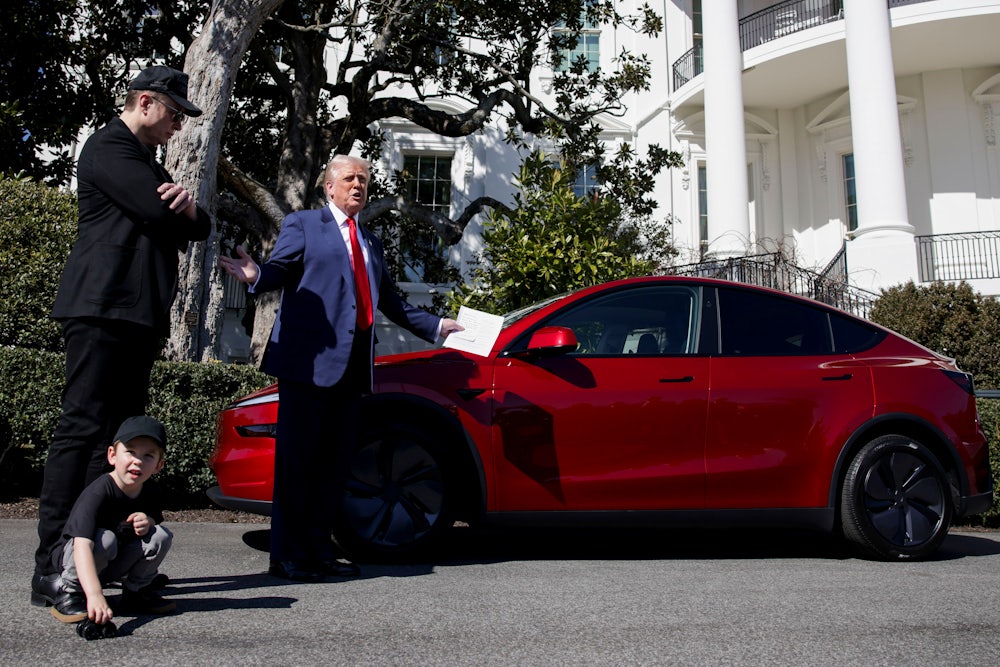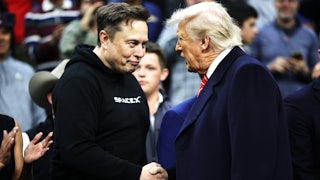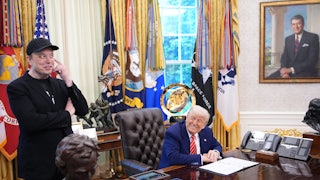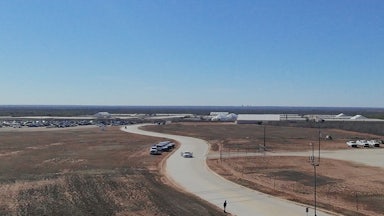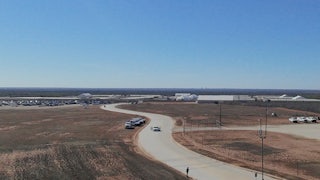As one of the century’s stupidest, most high-profile feuds escalated yesterday, President Donald Trump at one point threatened to cancel the U.S. government’s expansive contracts with SpaceX and Tesla, companies that are both at least nominally headed by ketamine enthusiast and Grimes-ex Elon Musk. In response, Musk threatened to “immediately” decommission SpaceX’s Dragon spacecraft, currently America’s only means of shuttling astronauts to and from the International Space Station. An X user with fewer than 200 followers then appeared to negotiate some kind of détente on the matter, prompting Musk to back down.
The bizarre, petulant, helplessly transfixing back-and-forth was a reminder that, while Musk’s time as a “special government employee” may be over, he’s still very much a part of the U.S. government. His business empire has been built on government largesse, whether through SpaceX’s expansive contracts with NASA, Starlink satellites, or the clean car rule compliance credits that have accounted for 34 percent of Tesla’s profits since 2012. As The Washington Post reported in February, Musk’s businesses have over the years received $38 billion in government contracts, loans, subsidies, and tax credits. In many ways, Musk owes his fortune to the U.S. government. A truce between Trump and Musk may be imminent, but, if he wishes to use it, Trump has a powerful wild card for sticking it to Musk: nationalize his companies.
A similar idea was floated online yesterday by Steve Bannon, the odious former film producer and Trump confidant, who suggested using the Defense Production Act to “seize” SpaceX. The wide-ranging Korean War–era policy outlines several steps by which the White House can bypass Congress to intervene in the demand and supply sides of particular industries. Those powers can include directing private companies to prioritize orders from the federal government, issuing loans and loan guarantees, and allocating “materials, services, and facilities” from corporations.
Just this week, Trump invoked the Defense Production Act to boost production of so-called critical minerals and weapons. A waiver published to the Federal Register on Wednesday claims that shortfalls of either would “severely impair national defense capability.” The Biden administration similarly leveraged the Defense Production Act to spur on the domestic production of graphite, a key component of the lithium-ion batteries used in military energy systems and electric vehicles. Both presidents turned to the law during the Covid-19 pandemic to address medical supply chain shortages and accelerate vaccine production. As the Roosevelt Institute’s Todd Tucker has pointed out, the Defense Production Act has been continually updated to give the White House broader authority over energy, in particular. Its 2009 reauthorization specifically excised language in previous versions that restricted the government’s ability to directly engage in energy production. After 9/11, the Defense Production Act’s definition of “national defense” was updated to include the protection and restoration of “critical infrastructure,” a legal designation of 16 sectors deemed essential to the functioning of the economy, including telecoms, information technology, and transportation.
In theory, that is, the Defense Production Act offers Donald Trump a massive toolbox with which to intervene in Musk’s business. He could stick it to the richest man on earth by ordering Tesla to stop making Cybertrucks and start making electric buses, or forcing Starlink to provide free internet service to everyone in the country.
As Bannon hinted, the law also opens up the possibility of requiring recipients of government funding—including those who have received loans and contracts—to give the government equity stakes in exchange. The first Trump administration did just that in 2020, when the Treasury Department sought equity stakes in publicly traded national security contractors, including defense firms, looking to receive the $17 billion set aside for them in coronavirus relief funds. Tying federal funding to public equity stakes is a common practice in other countries that’s somewhat rare in the U.S. The most prominent example in recent memory was when the federal government spent $50 billion on a 61 percent equity stake in General Motors, bailing out the automaker after its bankruptcy in 2009. While this move theoretically empowered the White House to enact wide-ranging reforms—correcting for the kinds of mistakes that had plunged GM into financial ruin in the first place—presidential advisers, including Larry Summers, then the head of the National Economic Council, pushed the Obama administration to instead act as a “reluctant equity owner” and “not interfere with or exert control over day-to-day company operations.”
The concept of the government seeking a “golden share” in certain companies has already come up during Trump 2.0. Trump obliquely floated the possibility of the U.S. receiving an equity stake as part of Nippon Steel’s controversial takeover of U.S. Steel, entitling the government to an advisory role that could allow it to outvote other shareholders on major issues like mergers and asset sales. Given the sheer scale of Musk’s dealings with the federal government—business he seemed eager to expand during his disastrous time in Washington—there are any number of options for Trump to bolster government oversight of SpaceX and Tesla, including, potentially, buying up shares.
Republican attacks on both electric vehicle incentives and California’s clean car rules, moreover, may end up costing Tesla billions of dollars, JP Morgan Chase analysts have found. Tesla is already struggling amid flagging sales in the U.S. and abroad; earlier this year at the White House, Trump even hosted a bizarre infomercial for Tesla, seemingly aimed at boosting the company’s fortunes. It’s not impossible to imagine that Tesla might at some point come begging for another handout, offering Trump the opportunity to do what Barack Obama couldn’t: play an active role in the day-to-day operations of a U.S. automaker.
To state the obvious, it is vanishingly unlikely that Donald Trump will use either public equity stakes or the Defense Production Act toward progressive ends. In March, his administration removed solar panels, heat pumps, and other green technologies from the Defense Production Act’s purview by rescinding several Biden-era executive orders. Doing so, though, would make Elon Musk really, really mad. If Trump is too afraid to exert that kind of power over Musk—who has demonstrated time and again his alarming sway over the federal government—whichever Democrat makes it to the White House next shouldn’t be.
